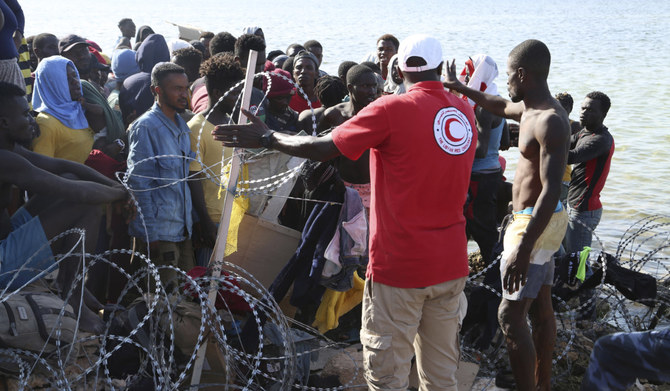TUNIS: When Mbengue Nyimbilo Crepin regained consciousness after collapsing in the desert, the sun had already set. Tunisian authorities had violently forced him, his wife and their six-year-old daughter across the border to Libya by foot without water, in the blazing heat, he said.
Nyimbilo crumpled to the ground, exhausted and dehydrated, but urged his wife to carry on with little Marie and catch up to dozens of other migrants ahead.
“God willing, we will meet again in Libya,” he told them.
Nyimbilo eventually made it there — only to find out days later that his wife and daughter almost certainly did not.
A graphic photo widely shared on social media shows the lifeless body of a Black woman with braided hair next to a little girl, their faces down in the sand.
BACKGROUND
Black Africans in Tunisia have faced increasing discrimination and violence since President Kais Saied’s February remarks that sub-Saharan migrants are part of a plot to alter the country’s identity and demographics.
The child is curled up next to the woman, her bare feet red and swollen, likely from walking on blistering hot sand.
Nyimbilo said he immediately recognized his wife’s yellow dress, pulled up on her body, and his daughter’s black sandals, sitting beside them.
He shared recent photographs with The Associated Press showing them in the same clothing.
He said he had not heard from his wife, Matyla Dosso, who also went by Fatima, or their daughter since that day in the desert, July 16.
Nyimbilo believes Matyla and Marie are among more than a dozen Black migrants Libyan border guards say they had found dead in the desert border area of the North African nations since Tunisian authorities began conducting mass expulsions in early July. Nyimbilo is from Cameroon, his wife, Ivory Coast.
They lived for years in Libya but hoped to finally make it to Europe via the Mediterranean Sea from Tunisia.
The Libyan police border guard in Al-Assa, near the Tunisian border, found the woman and child in the July 19 photo dead, spokesperson Maj. Shawky Al-Masry said. He declined to provide further details or say where the bodies are now.
Different border units have found at least 10 bodies on the Libyan side since last week, including that of another small child.
Black Africans in Tunisia have faced increasing discrimination and violence since President Kais Saied’s February remarks that sub-Saharan migrants are part of a plot to alter the country’s identity and demographics.
He said “hordes of irregular migrants” bring “violence, crime and unacceptable practices.”
The speech to his security council inflamed longstanding tensions throughout the region and country, but particularly between Tunisians and migrants in the port city of Sfax and other eastern coastal towns.
Tunisia has replaced Libya as the main point of departure for people attempting the deadly Mediterranean crossing to Italy, according to UN and other figures.
Through July 20, more than 15,000 foreign migrants were intercepted by Tunisian authorities — more than double that period last year, Interior Minister Kamel Fekih told parliament this week.
He blasted the influx of sub-Saharan migrants and said Tunisia can’t accept becoming “a transit country.”
Tunisian authorities have responded to rising tensions with a crackdown on Black migrants and refugees, and some have been rounded up from coastal cities and sent to Libya or Algeria — countries with their own long track records of grave human rights violations, abuses against migrants and collective deportations.
Human rights organizations, Libyan authorities and migrants themselves have accused Tunisia of violating international law with the mass expulsions across its borders.
Tunisian authorities long skirted a direct response to those accusations, but on Thursday, the Interior Ministry rejected any responsibility about “Africans outside its borders,” a clear reference to those in the desert.
The ministry stressed Tunisia’s right to protect borders and insisted it carries out its “humanitarian duty.”
Officials also issued a warning against publication of content from social networks and in news outlets, and made a veiled reference in a recent statement to prison sentences of up to 10 years for anyone circulating information it deems incorrect.





























